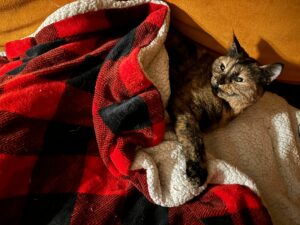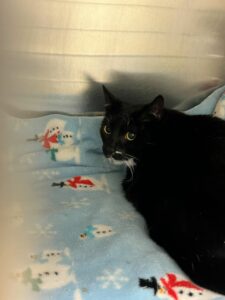 We’ve been swaddled.
We’ve been swaddled.
We’ve been chomped.
And, thanks to two very different sugar plums, we will never be the same.

We cannot choreograph the comings and goings at Tabby’s Place, and that’s fortunate. If it were up to us, we’d sway towards the cats who shriek with joy at the gingerbread houses we build them, the Gushily Grateful and the Happy-To-Be-Here.
And if we did that, we’d miss out on the Cookie Monsters.
But if this time of year is about anything at all, it’s about not missing anyone. (Yes, Valerie; it’s also about Santa Claus, who is indeed real. Yes, Grecca, it is also about Advent calendars, which should indeed contain tiny fish sticks instead of detestable chocolate.)
It’s easy not to miss Nina. More precisely, it’s impossible not to miss Nina once you’ve met her. Later that night, you’ll find yourself missing her massively, wistful in your snowflake pajamas, comforting yourself over Walmart sugar cookies as you doodle her name in your gratitude journal.
(Wait, is that just me?)
 Nina is the Sugar-Plum Fairy. Nina is the star at the top of the tree. Nina is every light on the menorah. Nina is the full moon. Nina is Santa Claus in black and orange. Nina is your Grandma at Christmas, your chenille sweater (you know the one — the “feel-better sweater” you wear when December is too heavy), and the hopes and fears of all the years, minus the “fears.”
Nina is the Sugar-Plum Fairy. Nina is the star at the top of the tree. Nina is every light on the menorah. Nina is the full moon. Nina is Santa Claus in black and orange. Nina is your Grandma at Christmas, your chenille sweater (you know the one — the “feel-better sweater” you wear when December is too heavy), and the hopes and fears of all the years, minus the “fears.”
Nina is the lullaby my own grandmother sang my mother, and my mother sang me: “Nina Nonna,” which technically means something like “little Grandma,” but which really means “my love for you is larger than myself, yourself, and all the elves on all the shelves, since love can never be shelved.”
No one who enters the Lobby can miss Nina, and Nina misses no opportunity to be swaddled, snuggled, and altogether addled with the splendor of life, even here, especially here. She spins when you speak her name, so astonished to hear it spoken, so eager to sing your own name back to you in lyrics beyond language.
But if I’ve painted a picture of the Easiest-To-Love Individual Who Hath Ever Trod The Earth, that is (a) accurate and (b) incomplete.
Nina is easy to love and impossible to miss.
And Nina almost missed out on this moment entirely.
For I have neglected to mention that Nina shakes like a snow globe, saddled with a seizure disorder. She will need a lifetime of special care. Born in Beirut, a street scrap with the shivers, she was a living challenge.
A challenge to care for.
A challenge to accommodate.
A challenge to any “love” that leans towards “easy.”
 Love is never easy.
Love is never easy.
But the hard-candy love of legions lifted Nina from the soot and into the Great Story. And here we are, gasping at her greatness, glad as gingerpersons for the grace that made her ours.
Nina needs us, and she lets it show, and we all feel very, very, very, very, very good.
It feels good to feel needed.
It feels good to feel needed, but it’s better to actually be needed. And sometimes, we need to fish beneath all the tinsel and lights to the truth.
Cookie Monster is a creature composed entirely of truth.

The truth is, Cookie Monster is not so sure she wants to be here.
The truth is, Cookie Monster does not keep a gratitude journal.
The truth is, Cookie Monster is not so much a sugar cookie as a shrapnel cookie (the Pioneer Woman does not have a recipe for these).
The truth is, Cookie Monster needs us.
If Nina could be typecast as The Great Innocent, Cookie Monster risks being known as The Great Guilty. (Needless to say, she does not deserve this title.) While Nina was hurled by thunderbolts beyond her honey-heart’s control, Cookie Monster was the cause of her hopeless situation. She chomped and raged and hospitalized at least one person. (I am not making this up.) She drew blood and drew scary pictures on the wall and drew from a well that kept returning empty buckets.
Cookie Monster tore up all the Thomas Kinkade paintings. Cookie Monster tore up someone’s arm. Cookie Monster tore up the Hallmark Movie scripts, and the gift receipts, and the expectations that love is ever easy.
Cookie Monster is, as of this writing, tearing up our hearts.

Cookie Monster is tearing down the tinsel-love that tells half-truths, like “you are safe when you are good,” and “you are loved because you are lovely,” and “‘lovely’ has a single look; see: Nina, Rose, etc.”
And that’s exactly why we need her.
For all her chomping, our cookie-colored Krampus is uncramping our arms and our expectations. She judges no one, not even herself; she gift-wraps nothing, not even her rage. She insists that we love her in her lava, that we light the fireplace for her even before she stops breathing fire, that we leave her as many cookies as we do for Santa himself, even if she never “comes around.”
She’s bringing us around to the meaning of our lives.
She’s coaxing us, with her sharp eyes and her sharp sense of self, to learn her language. She’s teaching us to speak softly, to deliver her Temptations (which she will eat with bawdy blinks, making literal Cookie Monster sounds), to enter slowly, to love bravely.
She, no less than Nina, is the stranger at our door, the angel in ragged clothing.
She, no less than you and me, is Love’s child.
And children are messy, sooty, magical mercies.
Love, if it deserves that name, always transfigures you. You will be changed. You will become more like your beloved — more Nina-jubilant, more Cookie-truthful, more Uncle Gil-gabby, more Cousin Steph-sentimental.
But we will also become more like ourselves.
This is the part where I can’t resist the urge to quote our greatest living poet, one Marcus Mumford: “love, it will not betray you, dismay or enslave you; it will set you free — be more like the man you were made to be.”
If this time of year is about anything at all, it’s about being made new.
May every stranger at our door welcome us home to ourselves.
